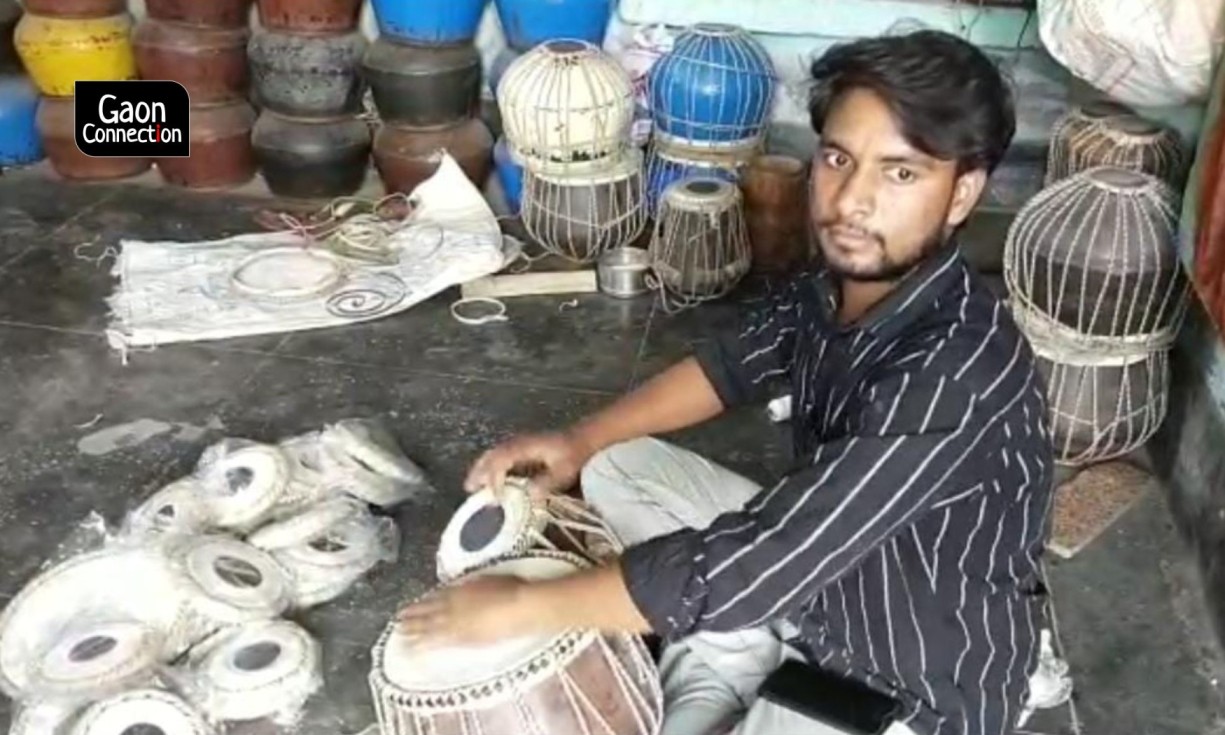Mirzapur, Uttar Pradesh
The tablas (percussion musical instruments) are falling silent, one by one in the many workshops that dot Gauriyan street in the Ramai Patti area of Mirzapur.
Most families living in this town, 285 kilometres north of the state capital, Lucknow, are into crafting and selling the percussion instrument. But since the pandemic, there is an eerie silence in its streets which once echoed with the sound of craftsmen tuning and testing the tabla.
The demand for tabla and other percussion instruments such as dholak (two-headed hand-drum) have fallen drastically leaving many craftspeople without a means of livelihood.
“I am barely managing to stay afloat,” Arif Ali, a tabla making workshop owner, told Gaon Connection. Ali’s workshop makes percussion instruments such as tabla, dholak, taal, tasha, etc and has been in the business for more than eight years.
“We not only make new pieces but also repair old ones and make them as good as new with our workmanship. Orders were coming in from abroad before the pandemic, but now they have dried up,” Ali lamented. He employed 10 workers at his shop, but now has just one other person other than himself making tablas.
Also Read: Mirzapur toys narrate a story of neglect
The tablas are painstakingly handcrafted out of wood of the neem, mango and sheesham trees, and goat or camel skin. Scores of these workshops have been forced to close down due to the lockdown and the paucity of orders.
“Before the lockdown, we used to make and send the tablas to America [the United States], Canada and Indonesia. While here we sell a tabla for six hundred rupees, we can get as much as two thousand five hundred rupees for it selling it abroad,” Ali said.
Now the meagre orders that do trickle in are from Maharashtra and Delhi.
Also Read: Govt support boosts Varanasi’s wooden toy industry but workers’ woes remain
No demand to tap into
Saddam Ansari routinely sent tablas to markets in Delhi, Mumbai, Goa, Kolkata and some places in Andhra Pradesh. He also exported them to European markets where he sold each tabla for Rs 2,500. But like Ali’s, the 34-year-old’s business has also gone down in the last one year.
He owned a musical instrument shop at Delhi but had to return to Mirzapur during the lockdown. “I have now become a labourer from being the owner,” he observed glumly. While some work was going on, Ansari said there was a shortage of orders and the cost of raw materials had gone up. “The demand for tablas has come down too,” he rued.
It is not just about orders drying up, but the price of raw materials has also shot up. “I had to cut down the wages of my workers during the lockdown. Whereas, the labour charge for preparing the head of the tabla was sixty rupees a day, we have reduced it to forty rupees,” said Ali. Each worker can make about 10 heads a day. Even after the lockdown was lifted the demand did not open up. “Now just one worker and I are enough to fulfil the few orders we get from Delhi and from Maharashtra,” Ali added.
Ansari had four workers working for him, but they left when there was nothing for them to do in the shop. “One of them is a vegetable vendor. And the rest are doing other things,” he said sadly. But Ansari is happy that he is at least providing employment to one other person, Ali Khan Ansari, who works alongside him. The 20-year-old who is studying in the tenth, comes to the workshop after school, but says there is not much for him to do there.
Also Read: Varanasi: COVID-19 lockdown shatters the livelihoods of handloom weavers and traders


















